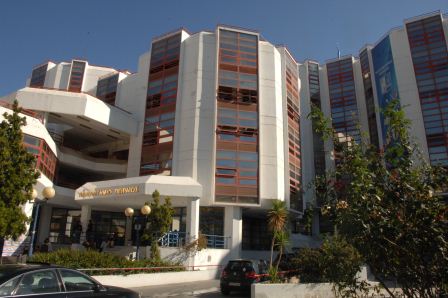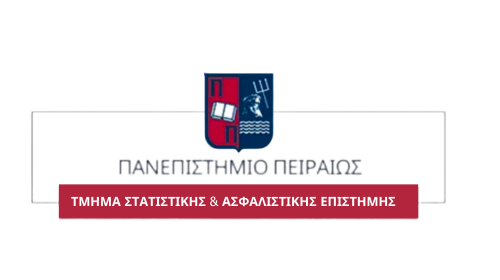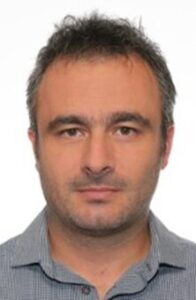Department of Statistics and Insurance Science
24 January 2024 2024-01-28 22:46Department of Statistics and Insurance Science
Contact
Secretariat of the Department:
email: sta-secr@unipi.gr
Tel.: 210-414 2083-86, 210-414 2222
Secretariat of Department’s Head:
email: head-sta@unipi.gr
Tel.: 210-414 2307, 210-414 2005

Department of Statistics and Insurance Science

The aim of the Department of Statistics and Insurance Science of the University of Piraeus is the theoretical and practical training of students in the fields of Statistics and Insurance Science, including Actuarial Science. The courses offered are a combination of theoretical and applied subjects. The students in the Department have the opportunity of specializing in both Statistics and Insurance Science through a balanced integrated program of carefully selected undergraduate courses.
The syllabus of the courses, besides the compulsory background courses and courses of general interest, includes a variety of subjects in the field of statistics – theoretical and applied – as well as subjects of interest in insurance and actuarial applications.
The graduates of the Department are equipped with the necessary knowledge and skills to deal with statistical analyses in centers of applied research, to become quantitative analysts or risk managers in financial institutions and insurance companies, or to pursue a career as an actuary. A substantial number of our graduates goes on to pursue postgraduate studies in their chosen field of interest from a wide spectrum of subjects which includes statistics, biostatistics, economics and finance, risk management, actuarial science, statistics with computing etc.
Undergraduate Studies
The Faculty aspires to produce graduates with a broad and comprehensive understanding of Statistics and Insurance Science and their interactions while still being able to offer services to a broad spectrum of employers. The nominal duration of the studies is four academic years. Each academic year comprises a Winter and a Spring Semester, i.e. a total of eight semesters. Each semester includes a number of mandatory and optional courses. Each course comprises lecturing, practical (laboratory) work and exercises (where applicable).
Currently, approximately 70 courses are offered, among which 19 are compulsory (COMP) and the rest are elective (EL). For the completion of the studies, a successful examination is required in 5 courses per semester, i.e. 40 courses in total. In particular, it is required: (i) Successful examination in all courses of the category COMP (19 courses), (ii) Successful examination in 21 courses of the EL category, at least 4 of which must belong to category A (Probability and Statistics) and at least 4 to category B (Actuarial, Insurance Science and Demography). The above applies to students who have been admitted to the department during the academic year 2017-18.
More details as well as special conditions that apply to students who have been admitted before the academic year 2017-18 can be found in the departmental Syllabus.
Postgraduate Studies
The Department of Statistics and Insurance Science offers two postgraduate programs that lead to MSc and PhD degrees.
– MSc in Applied Statistics, and
– MSc in Actuarial Science and Risk Management.
For more information on MSc in Applied Statistics click here.
For more information on MSc in Actuarial Science and Risk Management click here.
Research
The research activity of the teaching and research staff of the Department of Statistics and Insurance Science is very intense and continuous. The latter is verified due to the large number of publications of scientific articles in high quality international journals, as well as to the participation and organization of scientific conferences and workshops. There are also exist publications of books and monographs, participations in scientific conferences committees, in research programs, projects and in editorial committees of journals.
An important contribution to the advancement of research of the Department in recent years, was developed by the operation of our two postgraduate programs which constituted one of the most important reservoirs of doctoral candidates.
Last, but not least, the Research Committee of the University of Piraeus provides incentives for research into the members of the academic community, by covering (mainly) the costs of participation in international conferences.

Message from the Head of the Department of Statistics and Insurance Science Professor Georgios Iliopoulos
Dear students,
First of all, I would like to welcome you to the Department of Statistics and Insurance Science, one of the oldest departments of the University of Piraeus. Our Department treats two basic scientific subjects, Statistics and Insurance Science, which are based on Mathematics and in particular Probability Theory.
Statistics is a science which is applied to any scientific discipline in which quantitative or qualitative data are used and its purpose is to collect them, analyze them and build models for decision making and drawing conclusions. Medicine, Genetics, Economic and Social Sciences, Physics, Chemistry, Modern Technologies and any other discipline where measurements are made and data are observed, are based to a lesser or greater extent on the application of Statistics. The understanding and application of Statistics at the level taught in the undergraduate curriculum of the Department requires familiarization with the concepts and techniques of Calculus, Linear Algebra and Probability Theory. Insurance Science concerns everything related to the subject of Insurance, from Actuarial and Risk principles to practical and financial issues related to insurance. Actuarial and Risk principles and Management at the level taught in our programs are also based on Calculus and Probability Theory.
The undergraduate program of the Department, which is reviewed periodically, is designed to provide students with the basic knowledge of both subjects through theory and practice as well as through the use of appropriate software. Thus, our students acquire the necessary skills to either enter the market or continue to postgraduate studies in a program related to the subjects of the Department. A fact that testifies the high level of knowledge we provide to our students and the reputation of our Department is the large proportion of our graduates who continue their studies in highly reputed Universities, either in Greece or abroad.
Our Department also organizes high-level postgraduate programs related to Statistics and Insurance Science. The “MSc in Applied Statistics” combines theory with practice and statistical programming and has as its main objective to provide its graduates with solid foundations of knowledge and scientific research methods that will enable them to continuously improve and evolve while giving the opportunity to choose between four different directions: biostatistics, statistical methods in finance, Statistical quality control and statistical methods in data science. The “MSc in Actuarial Science and Risk Management” is addressed to those interested in becoming actuaries and risk managers and aims to serve the common interest through the training of senior executives who will be able to identify, analyze, measure and manage insurance and financial risks faced by insurance companies, banks and other related businesses.
I would like to assure you that the teaching and research staff of our Department makes every effort to pass on their knowledge and will help you to understand the basic concepts, methods and techniques that a young scientist who specializes in Statistics or Insurance Science should possess. So we invite you to take advantage of it!
Undergraduate Studies
The Faculty aspires to produce graduates with a broad and comprehensive understanding of Statistics and Insurance Science and their interactions while still being able to offer services to a broad spectrum of employers. The nominal duration of the studies is four academic years. Each academic year comprises a Winter and a Spring Semester, i.e. a total of eight semesters. Each semester includes a number of mandatory and optional courses. Each course comprises lecturing, practical (laboratory) work and exercises (where applicable).
Currently, approximately 70 courses are offered, among which 19 are compulsory (COMP) and the rest are elective (EL). For the completion of the studies, a successful examination is required in 5 courses per semester, i.e. 40 courses in total. In particular, it is required: (i) Successful examination in all courses of the category COMP (19 courses), (ii) Successful examination in 21 courses of the EL category, at least 4 of which must belong to category A (Probability and Statistics) and at least 4 to category B (Actuarial, Insurance Science and Demography). The above applies to students who have been admitted to the department during the academic year 2017-18 and later.
More details as well as special conditions that apply to students who have been admitted before the academic year 2017-18 can be found in the Department’s Syllabus.
Postgraduate Studies
The Department of Statistics and Insurance Science offers two postgraduate programs that lead to MSc and PhD degrees.
– MSc in Applied Statistics, and
– MSc in Actuarial Science and Risk Management.
For more information on MSc in Applied Statistics click here.
For more information on MSc in Actuarial Science and Risk Management click here.
Doctoral Studies
Doctoral Studies provide expertise in the Department’s research fields and aim to create high-quality scientific research as well as to create scientists capable of contributing to the advancement of science, research and applications. Graduates of our doctoral program are intended to support the research, entrepreneurship and educational staff of Greece and abroad.
Practice
The student internships have been included in the Curriculum of the Department of Statistics and Insurance Science of the University of Piraeus, in order to offer students work experience, in addition to theoretical training. In addition, it gives the opportunity to Employment Agencies and businesses to meet students in the context of a process of future selection of their scientific staff.
The Internship of the Department has been included in the operational program “Human Resources Development, Education and Lifelong Learning” of the NSRF 2014-2020 and is co-funded by the European Union – European Social Fund (ESF).
The Internship is governed by a Regulation of Operation which has been approved by the General Assembly of the Department. It lasts 2 months, full-time for students and takes place during July-August, with the exact start and end date determined each year by the competent Scientific Coordinator. The General Assembly of the Department has appointed for 2021-24 the Scientific Coordinator of the Department, Professor Platon Tinios.
Erasmus+
What is Erasmus+?
ERASMUS+ is the European Commission’s new programme for education, training, youth and sport, which aims to enhance skills and employment as well as modernise education, training and youth systems, in all areas of Lifelong Learning (Higher Education, Vocational Education and Training, Adult Education, School Education, youth activities, etc.).
The new programme for students and graduates combines all current EU programmes for education, training and youth. The International and Public Relations Office of the University of Piraeus undertakes Erasmus+ for Studies and Erasmus+ Placement.
Total Transportation
The student/graduate can move for a total of 12 months. This means:
- 12 months of study or
- 12 months placement (internship-conditional) or
- 5-6 months of studies and 6-7 months of placement
The Department of Statistics and Insurance Science collaborates with various Universities abroad (INTERUNIVERSITY AGREEMENTS) within the framework of the Erasmus+ lifelong learning program in order to exchange students and faculty members for educational, teaching and research purposes.
Students of the department can attend courses, usually of one semester, at the collaborating foreign Universities and if they are successfully examined in them, they can register them as courses of the current program of study. It is noted that in order to secure a course, the interested student must first contact the corresponding instructor of the Department of Statistics and Insurance Science before moving to the university abroad, in order to obtain a certificate that the course he will attend can be considered equivalent to one of the current program of study.
International Mobility for students
Within the framework of the Erasmus+ Programme, the mobility of students and staff of Higher Education Institutions to and from the Partner Countries is foreseen.
Within the framework of the Program, the University of Piraeus has concluded agreements with Academic Institutions of the Russian Federation, China, Armenia, Algeria, Egypt, Ethiopia, Morocco, Tunisia, Israel, Jordan, Kenya, Uganda, Ghana, Lebanon, Tanzania, Nigeria, Kazakhstan, Albania.
For more information on Erasmus+ for Studies, Erasmus+ Placement and International Mobility, the student can contact the Secretariat of the Department and the International and Public Relations Office of the University of Piraeus and/or erasmus.unipi.gr website for information.
Announcement with the Status of outgoing Erasmus+ undergraduate students for the academic year 2023-24 here.
Faculty Members

Retired Members | Area of Expertise | Research Interests |
Stegos Dimitrios, Assistant Professor (-2017) | Stochastic Decision Models | Markov Decision Models |
Vrontos Spyridon, Lecturer (-2016) | Actuarial Science | Discount–charge systems in auto– insurance, stochastic investment–liability models, stochastic processes with applications in actuarial and finance, stochastic long-memory processes |
Panopoulou Ekaterini, Assistant Professor (-2016) | Quantitative Methods with emphasis on Economic and Social phenomena | Applied and Theoretical Econometrics, International Finance, Macroeconomics |
Glezakos Michael, Professor (-2016) | Portfolio Analysis and Management | Portfolio Management |
Artikis Theodoros, Professor (-2014) | Probability Theory | Transformations of characteristic functions, Stochastic initial and final value models |
Benos Vassilios, Professor (-2011) | Statistics | Statistics – Sampling |
Kateri Maria, Associate Professor (-2010) | Statistics | Categorical Data, Bayesian Statistics, Biostatistics |
Kaffes Dimitrios, Associate Professor (-2008) | Mathematical Statistics | Mathematical Statistics |
Georgiakodis Fotis, Associate Professor (-2003) | Statistics | Discriminant Analysis, Neural Networks, Biometrics, Applied Data Analysis, Clinical Studies in Oncology |
Kiochos Petros, Professor (-2002) | Statistics | Actuarial Reports for Insurance Funds |
Skouludis Zacharias , Professor (-2001) | Private Law with emphasis on Civil and Insurance Law | Commercial Law, Civil Law, Insurance Law |
Full name | Area of Expertise | Research Interests |
Nektarios Miltiadis (-2020) | Private insurance | Private Insurance, Social Insurance, Public Finance |
Kyriazis Athanasios (-2019) | Applied Mathematics and New Technologies | Functional Analysis, Abstract Complex Analysis, Total Differential Geometry, Educational Technology, New Technologies in Education and Training, Educational Systems, Educational Structures and Institutions of the European Union |
Tsimpos Kleon (-2019) | Demography | Demographic Analysis Techniques, Mortality Data Analysis, Survival Tables, Population Projections |
Makhairas Nikolaos (-2018) | Probability Theory, Measure Theory | Liftings in Functional Analysis. Disintegrations. Martingales. Inductive and projective limits. Baire spaces. Topological representations of algebraic systems. Probability measures in topological spaces. Stochastic processes with independent increments. Foundation of stochastic processes. Point processes. Risk theory. Theory of structures |
Papadakis Michael (-2004) | Demography | Demographic survey, Economic survey, Social survey |
Papaioannou Takis (-2004) | Probability, Statistics and Operations Research | Statistical Information Theory, Categorical Data Analysis, Relevance Models, Biostatistics, Survival Analysis, Statistical Issues in Drug Development |
Full name | Title | |
Adjunct Lecturer 2023-2024 | stzaninis@unipi.gr | |
Adjunct Lecturer 2023-20242024 | fbersimis@unipi.gr |
Full name | Title | Office | Phone | |
EDIP | 307/Main Bld. | 210 414 2265 |
- Secretariat of the Department of Statistics and Insurance Science
The Secretariat of the Department of Statistics and Insurance Science is located on the lower level of the 1st floor of the Main Building (in order to get there you must first go up to the 1st floor). The Secretariat is responsible for archiving and announcing the results of the examinations, the announcement of graduates, the granting of various certificates, etc. For the issuance of all certificates, an application must have been submitted by the Student. The employees of the secretariat serve the public on specific days and hours, which are announced at the beginning of each academic year. Students have the opportunity to be informed electronically about their progress and issue certificates through https://sis-portal.unipi.gr.
Full name | Office (Main Bld.) | Phone | |
Tzivra Georgia (Department’s Secretary) | 1st floor, Office 115 | 210 4142083 | |
Tsilfidou Athanasia | 1st floor, Office 115 | 210 4142222 | |
Konstantelou Antonia | 1st floor, Office 115 | 210 4142084 | |
Kapoti Georgia | 1st floor, Office 115 | gkapoti@unipi.gr | 210 4142085 |
Garantzioti Georgia | 1st floor, Office 115 | 210 4142086 |
- Secretariat of Department’s Head
Full name | Office (Main Bld.) | Phone | |
Dimiri Eleni | 5th floor, Office 536 | 210 4142005 | |
Konstantinou Areti | 5th floor, Office 536 | 210 4142307 |
Research Activity
The research activity of the teaching and research staff of the Department is intense and is shown mainly by the publication of scientific articles in international journals, the organization of scientific conferences and workshops, the publication of books and monographs, the participation in scientific conference committees, announcements in international and national conferences, the undertaking and elaboration of research programs and projects, the participation in editorial boards of international scientific journals, etc.
An important contribution to the promotion of research in the Department in recent years has been played by the operation of the two postgraduate programs of study of the Department, which constituted the most important pool of doctoral candidates.
The Research Committee of the University of Piraeus provides incentives for conducting research to members of the academic community, covering mainly expenses for participation in conferences.
The faculty members of the Department have published articles in leading international journals. The following international journals are listed as examples, classified according to the main research area they cover.
Statistics
Annals of the Institute of Statistical Mathematics
Biometrika
Biometrics
Canadian Journal of Statistics
Computational Statistics and Data Analysis
Electronic Journal of Statistics
European Journal of Operations Research
Journal of Multivariate Analysis
Journal of Quality Technologyy
Journal of the American Statistical Association
Journal of the Royal Statistical Society Series C (Applied Statistics)
Journal of Statistical Planning and Inference
Psychometrica
Quality and Reliability Engineering International
Quality Technology and Quantitative Management
Scandinavian Journal of Statistics
The Annals of Statistics
Probability
Advances in Applied Probability
Annals of Applied Probability
Annals of Probability
Bernoulli
Journal of Applied Probability
Journal of Computational and Applied Mathematics
Journal of Computational and Graphical Statistics
Journal of Theoretical Probability
Methodology and Computing in Applied Probability
Probability in Engineering and Informational Sciences
Stochastic Processes and their Applications
Actuarial Science
ASTIN Bulletin
Insurance: Mathematics and Economics
Scandinavian Actuarial Journal
Insurance
Geneva papers on Risk and Insurance
Demography
Demography
European Journal of Population
Journal of Population Economics
International Journal of Public Health
International Migration Review
Population Studies
Information Technology
Data Mining and Knowledge Discovery
Future Generation Computer Systems
IEEE Transactions on Knowledge and Data Engineering
IEEE Transactions on Signal Processing
Journal of Intelligent Information Systems
Journal of Computer Assisted Learning
Knowledge and Information Systems
Signal Processing
Social politics
Journal of European and Social Policy
Political Studies
Political Studies Review
Journal of Population Economics
Ακολούθως δίνεται ο πλήρης κατάλογος των επιστημονικών δημοσιεύσεων των μελών ΔΕΠ (Πηγή: Έκθεση Εσωτερικής Αξιολόγησης του Τμήματος).
The number of research projects in which faculty members of the Department participated during the last five years, either as scientific managers or as collaborators, is quite satisfactory. It is worth noting that faculty members of the Department participate in approved research projects of the THALIS Program, which is funded by the Ministry of Health, while other faculty members will be the main researchers for the University of Piraeus in projects of the EXCELLENCE II Program, funded by the DG Research and Technology.
The following research programs and projects in which faculty members of the Department participated are indicated:
1. Asset Liability Management in A Time Varying Volatility Environment. 2008 Research Grant Competition, SOA, The Actuarial Foundation, CKER.
2. Efficiency analysis of the Greek insurance market.
3. Improving the national health system.
4. Integrated Project (6th European Commission Framework Programme): Water management under water scarcity conditions (AquaScarcity). Prepared within EurAqua, a network of leading European research organizations for linking science and policy and for providing relevant knowledge to promote the protection and sustainable use of European freshwater resources.
5. IPUMS, Integrated Population Micro-census data project.
6. Latsis Foundation Research Program: Regional Socio-economic Inequalities in Greece.
7. MOVE – The moving frontier: Delocalisation of labour intensive industries, (afroditi.uom.gr/move, ηέρευναολοκληρώθηκετο 2008).
8. National Catastrophe Insurance System for Greece.
9. New regulatory framework for insurance companies — Implementation of Solvency II.
10. EMPhAtiC (ICT-318362, http://www.ict-emphatic.eu) Project under FP7.
11. PHYDYAS (INFSO-ICT-211887, http://www.ict-phydyas.org). Project within the framework of FP7.
12. Restructuring public pension systems.
13. Semantic Enrichment of Trajectory Knowledge Discovery (SEEK), FP7/ PEOPLE Programme, 2012-15.
14. SHARE (Survey of health, ageing & retirement in Europe). Συντονιστής: Mannheim Research Institute for the Economics of Ageing.
15. WHO-health: Social Determinants of Health and the Health Divide in the WHO European Region.
16. Investigating Crucial Interdisciplinary Linkages in Aging Societies and acronym ICILAS (Investigating Crucial Interdisciplinary Linkages in Aging Societies). Proposal Panteio, Piraeus Crete.
17. The informal social state – “Excellence” Program of Panteion University.
18. Gender Pension gap in Europe – European Union Program (Research report for the EU DG Justice in collaboration with the University of Siena, Italy).
19. Upgrading Research on Health, Aging and Retirement in Europe – ESFRI Program within the framework of the European Strategy Forum for Research Infrastructure (ESFRI). Joint program of Pantheon University, University of Piraeus, Crete 2009 – 2010.
20. Inverse problem of electromagnetic wave scattering by chiral materials. 2007-2009. Special Account of EKPA Research Funds.
21. Elastic stimulation of multilayer media, 2009-2011. Special Account of EKPA Research Funds.
22. Validation of the methodology, based on which the credit scoring models are developed and used by Alpha Bank. The project concerned the investigation and validation of the methodology followed by the Retail Banking Credit Risk Management Department of Alpha Alpha Bank for the development of credit scoring models (1/11/2008 to 28/2/2009).
23. Validation of the methodology, based on which credit scoring models are developed and used by Alpha Bank’s Business Credit Credit Risk Management department. The project concerned the investigation and validation of the methodology followed by the Credit Risk Management department of Business Credit for the development of credit scoring models (1/6/2009 to 30/9/2009).
24. Pythagoras Program: Strengthening research groups in Universities: New methods of statistical quality control using hit stream theory and Chen – Stein techniques. 2005-2008.
25. Scattering of spherical electromagnetic waves by chiral materials. 2005-2007. Kapodistrias, Special Account of Research Funds of EKPA.
26. Combining Population and Sample Survey Data on Births and Families, US National Institute of Child Health and Development (NICHD). Program manager: Dr. Michael S. Rendall (RAND Population Research Centre, USA).
27. EIKOS – Theoretical and Algorithmic Foundation for Person-Centered Collaborative Information Systems”. National research project funded by GGET / THALIS (2012-15) [web.imis.athena-innovation.gr/projects/eicos].
28. SEEK – Semantic Enrichment of Trajectory Knowledge Discovery”. European research project funded by FP7/ PEOPLEProgramme [www.seek-project.eu].
29. Live Roads – Traffic load calculation system and interactive transmission of road safety data to the entire road network, in real time, using the location and speed data of modern mobile phones with GPS receivers. National research project funded by GGET / PEPAttikis (2011-13).
30. Data Science for Simulating the Era of Electric Vehicles (DATASIM), FP7/ICT/FET-Open Programme, 2011-14.
31. Spatio-temporal and Semantic Data Management for the Documentation of Historical Information (DIACHORON), General Secretariat for Research and Technology and European Commission, program “Research and Technological Development Joint Ventures in National Priority Sectors” of measure 1.2 of the EP of Attica.
32. Ontology-Driven Metadata Creation and Management for “Smart” Searching of Text and Image Collections (MetA-On), General Secretariat for Research and Technology and European Commission, program “Image, Audio and Language Processing” of measure 3.3 “Research and Technological Development in the Information Society”.
33. Geographic Privacy-aware Knowledge Discovery and Delivery (GeoPKDD), (IST/FET – STREP Project), 2006-2008.
34. MODAP – Mobility, Data Mining, and Privacy, EU FET-OPEN 2009-2012. The Future and Emerging Technologies Open Scheme. URL: www.modap.org.
35. MOVE – Knowledge Discovery from Moving Objects, ESF/COST Programme, 2009-13. URL: www.move-cost.info.
The Department has organized important international and pan-Hellenic conferences, symposia, and workshops in the area of statistics, insurance science, and data science. More specifically, the following conferences and workshops have been organized (by year):
1997: 10th Panhellenic Conference on Statistics (28-31/05/1997), University of Piraeus.
2004: 2nd International Workshop in Applied Probability (IWAP, 22-25/03/2004), University of Piraeus.
2007: 1th International Congress on Insurance Mathematics (IME, 10-12/7/2007), University of Piraeus.
-2010: 28th European Meeting of Statisticians (EMS, 17-22/8/2010), University of Piraeus.
2011: Actuarial Science and Risk Measures Workshop – 1st Actuarial Day (14/01/2011), University of Piraeus.
2011: Actuarial Science and Risk Measures Workshop – 2nd Actuarial Day (14/05/2011), University of Piraeus.
2011: Actuarial Science and Risk Measures Workshop – 3rd Actuarial Day (14/10/2011), University of Piraeus.
2012: Actuarial Science and Risk Measures Workshop – Solvency II (11/05/2012), University of Piraeus.
2012: Actuarial Science and Risk Measures Workshop – Risk Dependency and Ruin (09/11/2012), University of Piraeus.
2013: 3rd International Symposium on Statistical Process Control (9 – 11/7/2013), University of Piraeus.
2013: 26th Panhellenic Statistics Conference (8-11/5/2013), University of Piraeus.
2015: Applied Stochastic Models and Data Analysis International Conference (30/6- 4/7 2015), University of Piraeus.
2016: Executive Seminar Actuarial Science – Risk Measures and Topics on Solvency (20/10/2016), University of Piraeus.
2017: Executive Seminar Actuarial Science – Risk Measures (20/10/2017), University of Piraeus.
2018: International Society for Business and Industrial Statistics (4-6/7/2018), University of Piraeus.
2018: 1st International Workshop on Big Mobility Data Analytics (3/2018), Vienna, Austria (satellite event of International Conference on Extending Database Technology 2018).
2019: 2nd International Workshop on Big Mobility Data Analytics (3/2019), Lisbon, Portugal (satellite event of International Conference on Extending Database Technology 2019).
2019: 1st International Conference on Data Analytics & ML for Insurance Fraud Detection (20/6/2019), University of Piraeus.
2020: 3rd International Workshop on Big Mobility Data Analytics (3/2020), Copenhagen, Denmark (satellite event of International Conference on Extending Database Technology 2019).
2020: 2nd International Conference on Data Analytics & ML for Insurance Fraud Detection (21/10/2020), University of Piraeus.
The Department organizes lectures with distinguished speakers on Statistics and Insurance – Actuarial topics. The following lectures are mentioned as examples:
- George Haiman, Pierre and Marie Curie University – Paris 6, France
“Scan statistics generated by some stationary sequences”
- Alex Kuiper, Institute of Business and Industrial Statistics, University of Amsterdam
“Applying (Lean) Six Sigma in Services”
- Michael Akritas, Professor of Statistics, Penn State University, USA
“Single and Multi Index Models for Mean and Quantile Regression”
- Philippe CASTAGLIOLA, University of Nantes, Γαλλία
“ZERO-INFLATED PROCESSES: ESTIMATED PARAMETER CASE AND EXTENSIONS“
- Marianthi Markatou, Department of Biostatistics and Institute for Healthcare Informatics, University at Buffalo, The State University of New York (SUNY)
“The Role of Kernels in Data Analysis: A Statistical Perspective”
- Claude Lefèvre, Free University of Brussels, Belgium
“Polynomials, order statistics and risk models in Insurance and Epidemics”
- Giovanna Capizzi, University of Padua, Italy
“Statistical process monitoring and variable selection algorithms”
- Luís Castro, University of Aveiro, Portugal
“Wiener-Hopf factorization and non-linear stochastic dynamical systems”
- Kardaras Konstantinos, London School of Economics and Political Science
“A version of the Fundamental Theorem of Asset Pricing”
- Marco Scarsini, LUISS, Italy
“Bayesian Social Learning from Consumer”
- Athanasios Rakitzis
“Control Charts for Monitoring Processes with an Increased Number of Zero Values”
- Ori Davidov, University of Haifa, Israel
“The linear stochastic order and directed inference for multivariate ordered distributions”
- Serkan Eryilmaz, Atilim University, Ankara, Turkey
“Runs and extremes in a discrete time risk model”
- Fernanda Otília Figueiredo, Department of Economics at the University of Porto, Portugal
“Comparison of sampling plans by variables using the bootstrap and Monte Carlo simulations“
For more information regarding our conferences and seminars, those interested can be informed by the announcements of the Department.
1. Where can I be informed about the Department of Statistics and Insurance Science and its programs?
On the website of the Department of Statistics and Insurance Science you can find all the necessary information. More specifically, in the Undergraduate Studies → Studies section . In the same section, the Department’s Study Guide is available, which contains detailed information on the courses and the Semester Program, including the course outlines and other information on the compulsory courses, elective courses, credit units, lecturers etc.
2. Where is the Department of Statistics and Insurance Science located?
The Department Secretariat is located in office 115, on the 1st floor and the Chair’s Office is located in office 536, on the 5th floor in the main building of the University of Piraeus at 80, Karaoli and Dimitriou Street. On the ground floor of the same building, in room 006, are the Laboratories of the Department. The offices of the teaching staff are housed in the main building of the University of Piraeus at 80, Karaoli and Dimitriou Street, as well as in the building of the University of Piraeus at 126 Gr. Lambraki Street.
3. How is it possible to access the Department of Statistics and Insurance Science by using Public Transport?
The following transit lines have routes that pass near the University of Piraeus.
• Bus: 040 , 049 , 218 , 703 , A1
• Metro: M1
For students, a monthly multi-trip card is available for 13.50 euros, which they can issue at any metro station.
4. When can I make my initial registration in the Department of Statistics and Insurance Science?
At the deadlines announced every year by the Ministry of Education and Religion. A related announcement is also posted in the Announcements of the Department.
5. I am a first year student, where can I find guidelines for my studies?
Detailed instructions are given in the link below:
Guides for students (also to create an institutional account)
6. What days and hours does the Secretariat is available for students and what are the methods of communication I can use?
Due to the special conditions created by the pandemic, the Secretariat is available for students daily by phone or by e-mail. Communication with students in person, by appointment only, every Monday, Wednesday and Friday from 11:30 a.m. to 2:00 p.m. and since requests cannot be served remotely. After the end of the pandemic, the Secretariat will again follow its old operating hours and will accept students without an appointment, on the above days and times.
The contact details of the Secretariat of the Department of Statistics and Insurance Science are as follows:
Address: 80 Karaoli kai Dimitriou, 18534, Piraeus, 1st floor , room 115
Phones: 210.4142083 -7, 2104142222
E-mail: sta-secr@unipi.gr
7. Where can I find all the forms/applications I will need during my studies?
All the forms/applications you will need during your studies are posted on the Department’s website in the field For Students → Secretariat Forms .
8. How can I contact the professors of the Department?
The contact details (telephone and e-mail) and the offices of the teachers of the Department of Statistics and Insurance Science are posted in the section Staff → Teaching and Research Staff
The professors’ office hours during which they accept students are posted at the beginning of the academic semester on the Department’s website.
9. How do I renew my registration?
By submitting a course declaration at the beginning of each academic semester, on dates determined by the Dean of the School of Finance and Statistics and announced by the Department Secretariat.
10. What procedure do I have to follow for removal from the Department?
• Students who have been admitted through Panhellenic exams to another Department or School and wish to be deleted from our department, submit a request for deletion through the Ministry’s electronic application.
• Students who wish to be removed from the Department for other reasons submit a request for removal to the Department Secretariat. The relevant application is available on the Department’s website in the section For Students → Secretariat Forms . If the application is sent then it must be authenticated as to the authenticity of the applicant’s signature.
In both cases, the student is required to submit his Academic ID – Special Ticket (pass) to the Department’s Secretariat.
11. How can I request interruption/suspension of studies?
By submitting an application for interruption/suspension of studies to the Department Secretariat at the beginning of each academic semester. The relevant application is available on the Department’s website in the field Student Affairs → Secretariat Forms .
The student may request an interruption of studies for an even number of semesters, due to the sequence of courses and not more than the minimum number of semesters required to obtain the degree, unless the interruption is due to proven health reasons or force majeure.
For as long as the interruption/suspension of studies lasts, the student’s Academic Identity Card – Special Ticket (pass) is deposited at the Department Secretariat.
12. What is the procedure for creating an institutional account and gaining access to the University’s online services?
In order to have access to the University’s online services, it is necessary to create an institutional account.
As soon as the entry of your data into the Information System of the Secretariat is complete, you should visit the service https://uregister.unipi.gr , where, using the mobile phone or the e-mail you registered in the system of the Ministry of Education and of Religion, you will be able to create your institutional account. There the system will give you your username and give you the possibility to enter your password. During the uregister process don’t forget to register a valid mobile and a valid email to recover your password in case of loss.
Also, you should know that uregister confirms certain information (such as your e-mail, mobile phone, first and last name, patronymic and AMKA), so if there is an error in the information you have registered in the system of the Ministry of Education and Religions, you may encounter a problem when creating the account and need to correct your details through the Secretariat.
Complementary to the uregister service is the https://mypassword.unipi.gr/ service , from where you can recover or change your account password, if you have forgotten it, through the recovery email or mobile number you indicated during creation of your institutional account via uregister.
13. What is the electronic system https://sis-portal.unipi.gr ?
It is the online application of the Electronic Secretariat. From this application you can:
• to be informed about the courses of the study program, the teachers, the recommended books, etc.
• submit registration statements and course statements each academic semester.
• to be informed about the score in the courses you have been examined.
• receive study certificates immediately and in electronic form.
This application is accessed through your personal passwords.
14. How are courses declared?
The declaration of the courses of each academic semester is done by the students through the electronic system https://sis-portal.unipi.gr , on the deadlines announced by the University of Piraeus.
15. Is my eclass registration also a course registration?
No. Courses are registered exclusively through the electronic system https://sis-portal.unipi.gr while eclass is the asynchronous teaching platform.
16. How many courses can I register for?
Students following the 2017 Curriculum and later must declare a number of Elective courses of their semester of study in order to complete (together with the corresponding Compulsory courses) exactly 30 ECTS credits. Specifically, depending on the semester they are studying, they should choose:
Semester | 1 o | 2 o | 3 o | 4 o | 5 o | 6 o | 7 o | 8 o |
elective courses | 1 | 1 | 4 | 2 | 3 | 3 | 2 | 5 |
Students following the 2011-2016 Curriculum must declare a number of Elective courses of their semester of study in order to complete (together with the corresponding Compulsory courses) exactly 30 ECTS credits. Specifically, depending on the semester they are studying, they should choose:
Semester | 1 o | 2 o | 3 o | 4 o | 5 o | 6 o | 7 o | 8 o |
elective courses | 0 | 2 | 1 | 1 | 3 | 2 | 3 | 4 |
Students following the 2001-2010 Curriculum may register up to 6 elective courses per semester (apart from the mandatory ones that the student may owe).
Students following the 2000 Curriculum and earlier should in any case contact the Secretariat regarding the assignment and examination of their due courses.
All the courses of the academic semester in which the student is in can be declared, in accordance with the aforementioned as well as those owed from previous semesters of studies, provided that they belong respectively to the spring or winter semester (depending on the period of declaration of the courses).
It is not allowed to declare courses for semesters longer than the student’s semester of study.
An elective course that has not been examined or does not have a transferable grade, may be replaced with another elective course, taking into account that the number of essays the student is entitled to receive cannot exceed the prescribed number of courses for obtaining a degree.
More detailed information can be found in the Undergraduate Studies Regulations , posted on the Department’s website.
17. In how many courses do I have the right to regrading?
The students of the Department are entitled, by applying to the Secretariat before the start of each examination period, to improve their grades in six courses, in their entire studies. The grade improvement of each course is allowed only once. The request for regrading contains a waiver of the student’s existing transferable grade. Therefore if when re-examining a course:
• if a transferable grade occurs, the new transferable one is registered.
• if a non-transferable grade occurs, the non-transferable grade is recorded, in which case the student owes the course and can be re-examined any examination period he wishes and the course in question is examined.
• if the student does not come to be examined, no grade is registered and the student (after having waived the previous grade that can be promoted) owes the course and may be examined any examination period he wishes and the course in question is examined.
18. What should I pay attention to when registering online for winter and spring semester courses?
I take care of the timely submission of the declaration of the courses, within the deadlines that are announced and certainly several days before the deadline, so that in case I encounter any technical problem, there is sufficient time to solve it.
After completing the declaration, make sure to press submit the declaration to the system. After submitting the declaration, I log back into the system and check that my application has been submitted correctly. I print and keep the statement of courses I submitted.
It is pointed out that after the expiration of the relevant deadline, the system closes and it is not possible to submit a course declaration (with the corresponding consequences for the ability of students to participate in the workshops and exams of the courses).
The Secretariat cannot help in any way the students who did not submit a declaration, for this reason it is important that they do not neglect to submit the declaration.
19. Are there courses with compulsory attendance in the Department of Statistics and Insurance Science?
The attendance of the teaching (lectures, tutorials, workshops, seminars, etc.) of the courses by the students is as a rule optional, but the teacher can define compulsory attendance of some of the laboratory exercises of the course.
20. How can I issue a simple study certificate or for military use?
You can issue and print a simple study certificate or for military use at home via the sis-portal.unipi.gr application . This certificate has an electronic signature and is accepted by all public and private sector bodies.
To print the certificates, follow the steps for issuing Electronic Documents .
In case you wish to receive a certificate with an original signature, a request is sent to the Department Secretariat via the sis-portal.unipi.gr application and you receive it 1-2 working days later, by appointment.
21. How can I issue a detailed rating for internal or external use?
In case you want a detailed score for internal use, send a request to the Secretariat of the Department through the application https:// sis-portal.unipi.gr and you will receive it after 1-2 working days, on the days and times served by Secretariat.
In case you want a detailed score for use abroad, send a relevant request to the Secretariat of the Department through the application https:// sis-portal.unipi.gr and you will receive it after 3-4 working days, on the days and times served by Secretariat.
22. Is free software provided for educational use to students of the Department?
Free commercial software for educational use is available to the students of the University of Piraeus, via the website https://helpdesk.unipi.gr/software , which includes instructions for each available software.
23. Which asynchronous teaching platform does the Department of Statistics and Insurance Science use?
The Department of Statistics and Insurance uses the eclass.unipi.gr platform where you can register with your institutional account, from “Registration → Student → Login with institutional account”. For information and support on the platform, contact the email eclass @ unipi . gr or the email helpdesk @ unipi . gr . For more detailed information follow the link below:
Guide for freshmen (creating an institutional account)
24. Which modern teaching platform does the Department of Statistics and Insurance Science use?
To conduct modern teaching, the University of Piraeus has installed the Microsoft Teams platform, which is centrally supported by the University’s services and used by all Academic Departments. Due to the special conditions created by the pandemic, all the courses of the Department of Statistics and Insurance Science are carried out remotely with electronic teaching.
Detailed instructions to students for the Microsoft Teams platform are provided at the following link:
https://www.unipi.gr/unipi/images/various/ilekt_ipiresies/UnipiTeamsForStudents_V1_01.pdf
Also, frequently asked questions-answers for the Microsoft Teams platform are provided at the following link:
https://www.unipi.gr/unipi/images /various/ilekt_ipiresies/FAQ_v_1_01.pdf
25. Is there a Wireless Network/ wi-fi at the University?
All areas of the University are covered by a free wireless wi-fi network called unipi. You can connect to it either with a laptop or from your mobile phone, without using a password.
26. Where can I find instructions for participating in remote exams?
Click on the following link: Instructions to students for distance exams
27. Can I access University services remotely?
Of course, there is the University’s internal network access service (VPN service) and it provides the possibility of using the University’s electronic services from remote locations or networks, such as e.g. from home Internet connections. Through this service, it is possible, for example, to access the content of electronic scientific books, journals and databases that the Library has, from jobs outside the University. More information about this service can be found at https://www.unipi.gr/unipi/el/hu-sundesh-vpn.html
28. Does the University provide students with an e-mail account?
No. Undergraduate students are not provided with the ability to obtain email at this time.
29. How can I issue an Academic ID – Special Ticket (pass)?
Academic ID – Special Ticket (pass) is mandatory for all registered students. It is issued after an application to the Electronic Service for Obtaining an Academic Identity – Special Ticket (pass) of the Ministry of Education and Religious Affairs at the address http://academicid.minedu.gov.gr . In order to be able to carry out the online application for the granting of an Academic Identity Card – Special Ticket (pass) by a student of the first cycle of studies, the access codes (username-password) are required that are granted to the registered students by the relevant Department and are used for its electronic services Institution to which it belongs.
In case the student has not received the relevant codes, as well as for any other access problems, he can contact the Secretariat of his Department or the Network Center of his Institution.
After successfully logging into the system, the student must confirm the correctness of his details. In case the student discovers any mistake, he should contact the Secretariat of his Department or the Network Center of his Institution, in order to make the relevant correction. Next, the student should fill in the rest of the personal information that will be requested.
30. Are there specific dates on which I need to apply to get my Academic ID – Special Ticket (pass)?
Students can submit an online application to obtain an Academic Identity – Special Ticket (pass) throughout the academic year. Detailed information about the procedures related to the issuance and receipt of the Academic Identity – Special Ticket (pass) can be found at the following link:
http://academicid.minedu.gov.gr
31. For how many years am I entitled to an Academic ID – Special Ticket (pass)?
The use of the Academic ID to prove the student’s identity in academic procedures, e.g. participation in the exams, valid until they graduate from the Department.
However, only the Academic IDs of the students will have validity and a Ticket for their movements, so that they are entitled to the discounts provided by the current legislation:
a) full study of the first cycle of studies who do not already hold a university degree for the number of years required to obtain a degree according to the indicative study program increased by two (2) years.
b) partial study of the first cycle of studies who do not already hold a university degree for twice as many years as are required to obtain a degree according to the indicative curriculum.
c) member states of the European Union and third countries, who study at national HEIs within the framework of the mobility program of the European Union “Erasmus” for the duration of their studies at the national HEI.
Termination of student status for any reason (interruption, deletion) automatically means termination of the right to hold the Academic ID, which in this case should be returned to the Department Secretariat.
32. How can I reissue an Academic ID – Special Ticket (pass) due to loss/theft?
In case of loss/theft of the Academic ID – Special Ticket (pass) the student presents to the Department Secretariat the relevant declaration of loss/theft from the police and requests the reissuance of the Academic Identity – Special Ticket (pass). Following the reissuance approval by the Secretariat, the process of obtaining the Academic ID – Special Ticket (pass) is repeated from the beginning.
33. How can I register my documents and where will I receive them?
The declaration and receipt of transcripts for each academic semester is carried out electronically through the website of the “Eudoxos” system , following a relevant announcement from the Department’s Secretariat. In order for a student to be able to make a statement of writings, the access codes (username – password) are required that are granted to registered students by the relevant Department and are used for the electronic services of the Institution to which it belongs.
The collection points of the documents you have declared are specified on the website of the “Eudoxos” system .
We point out that the declaration of co-authorships in “Eudoxos” must definitely agree with the declaration of courses on students.unipi.gr per semester.
34. Where do I go for any questions/questions regarding the “Eudoxos” system?
On the website of the “Eudoxos” system, specifically in the “Frequently Asked Questions” field , you will find answers to all your possible questions.
35. Where can I find information about feeding and housing?
For students who are entitled to meals, the https://sitisi.unipi.gr/ platform operates through the Student Welfare department, where you can register your application and upload the necessary supporting documents.
From the same platform, students who meet the necessary criteria can apply for accommodation in a student residence. All instructions are posted on the website of the Student Affairs department .
36. Are prizes – scholarships – stipends awarded to students?
Entrance Scholarships, Merit Scholarships, Entrance Awards and Merit Awards are awarded to undergraduate students in accordance with the State Scholarship Foundation’s (I.K.Y.) “Higher Education Scholarships Regulation – Merit Scholarships and Awards Scheme”.
Website: https://www.iky.gr/el/
37. Where can I find information about the Internship?
The internship is an elective course included in the 7th and 8th semester of the Department of Statistics and Insurance Science.
Information about the Internship can be found on the department’s website and in particular in the section Undergraduate Studies → Internship Program , as well as on the Piraeus University’s internship website and in the “ATLAS” Student Internship Central Support System .
38. Where can I find information about the Erasmus Programme?
On the website of the department and in particular in the section Undergraduate Studies → Erasmus Program , as well as on the Erasmus Website of the University of Piraeus .
39. What are Study Advisors and how can they help?
Faculty members of the Department of Statistics and Insurance Science (by subject) have been appointed as Academic Advisors. Study Advisors inform, inform and advise students on all matters of their studies and their subsequent professional careers, advise and support first-year students in order to facilitate the transition from secondary to higher education and provide special supportive care to students who they face family, personal or other difficulties in successfully completing their studies. More detailed information is given on the website of the Department in the section Department → Department Committees and in the Regulations of Undergraduate Studies .
40. What are the requirements for obtaining a degree?
For the requirements for receiving a degree by study program, consult the department’s website in the field Undergraduate Studies → Study Programs as well as the study guide posted on the Department’s website.
41. How can I request a certificate of participation in the exams?
Each teacher completes and signs the certificate of participation in the course examination.
42. What do I do when I finish all my obligations, in order to be declared a graduate of the Department?
I send or present to the Department’s Secretariat an application for the declaration of a graduate. The relevant application is posted on the Department’s website in the field Student Affairs → Secretariat Forms .
The application must be accompanied by the receipt for printing the student’s parchment. For the issuance of the receipt, contact the Accounting Office of the University of Piraeus (80 Karaoli and Dimitriou, 4th floor).
43. When do I have to swear?
Swearing-in ceremonies take place three times a year, one for each examination period, according to the Academic Calendar of the University of Piraeus. The student who is declared a graduate is automatically included by the Department’s Secretariat in the Department’s next inauguration. The exact date and time of each swearing-in ceremony, as well as the names of the announced students participating in it, are announced on the website of the Department of Statistics and Insurance Science.
In the current period, due to the special conditions created by the pandemic, the swearing-in ceremonies are not taking place.
44. Is it mandatory to participate in an oath-taking ceremony?
Yes, based on the Internal Regulation of the University of Piraeus, it is mandatory to attend the swearing-in ceremony in order to receive your official degree.
45. Are postgraduate studies offered at the Department?
The Department of Statistics and Insurance Science operates two Master’s Degree Programs. Detailed information on each of them can be found on the Department’s website in the field of Postgraduate Studies .
46. What do I need to request a letter of recommendation?
Most graduate programs in Greece and abroad, as well as many employers, require candidates to accompany their applications for studies or work with letters of recommendation.
Each professor has specific criteria for accepting to write a letter of recommendation, criteria that are usually linked to the academic performance of the students in the courses they have taught.
When requesting a letter of recommendation from a Professor, be sure to provide the following information:
• Description of the graduate program you are interested in along with an online link to search for more information.
• The deadline for submitting the letter of recommendation.
• The format and method of submission of the letter of recommendation (printed or on a digital platform).
• Your detailed score in all courses.
• Complete and up-to-date CV.
• Your full contact details.
47. Where is the University Library and what are its opening hours?
The Library of the University of Piraeus is housed in the main building of the University, in the second basement. Its entrance is on the central circular staircase in the middle of the ground floor. Also, for the disabled, the elevator on the left side of the building is used. It is addressed to professors, researchers and students and its mission is to support education and research.
The Library consists of three main areas:
• The Reception Area, where the movement area of the material, the closed collection, rare collections and the computers for searching the catalog and information sources are located,
• The Library, which houses the entire printed library collection, the photocopier and computers for readers, and
• The Reading Room, where there are dictionaries, displays with the latest issues of printed magazines and other informational material.
In the current period, due to the special conditions created by the pandemic, the Library remains closed. After the end of the pandemic, the library will reopen and will be open every day from Monday to Friday 08:00-20:00.
For more information about the services offered, you can visit the Library’s website.
48. What is the University Liaison Office?
The basic aim of the Liaison Office is the multifaceted support of students/graduates for their smooth integration into the labor market and for a successful career. It promotes the development of dynamic partnerships and the service of four poles, the Students & Graduates of the University, the Teaching & Research Staff of the University, Businesses, public and private bodies and organizations and Secondary Education.
For more information about the services offered, you can visit the website of the Liaison Office .
49. What is the University Counseling Center?
The Counseling Center of the University of Piraeus functions as a place of Meeting, Support, Communication and Intervention, with the aim of helping students deal with any difficulties they have during their studies.
The intervention and treatment of the resulting needs can be done either through individual and group psychological counseling, or through conducting seminars focusing on promoting the academic adjustment of the student population.
For more information about the services offered, you can visit the website of the Counseling Center .
50. What can I do after I graduate? What can my professional rehabilitation be?
Graduates of the Department are equipped with the required knowledge to be employed as statisticians or data scientists in research and application centers (polls, market research, medical centers, etc.), in the private and public sector or as actuaries, analysts and risk assessors in insurance companies and insurance organizations and even as quantitative investment analysts and risk management officers in banks. Graduates of the Department can be appointed to public services, companies, organizations, Banks, the Statistical Service and other bodies dealing with Statistics, such as KEPE, EKKE, etc. They can also teach in technical and vocational education, after studying in the corresponding department of ASPAITE to obtain a certificate of pedagogical competence. In the private sector, they can be employed in insurance companies or other businesses and financial units as senior employees, researchers, analysts, financial advisors, etc.
51. Are graduates of our Department required to take exams in order to obtain an insurance broker license?
Yes, they are not exempt from the relevant exams.
52. What do I do if I have a technical problem or question?
For technical support you can contact e-mail (Institutional account) and (other central electronic services of the University) stating the problem, your registration number and a screenshot of the error message/problem you are facing.
For technical problems related to services managed by external entities, you should contact the external entity.
For problems related to the correction/editing of your data in the student log and general procedural issues of your studies, you should contact the department’s Secretariat at the e-mail address sta-secr@unipi.gr .
53. Can I get a certificate of knowledge of IT or computer operation from the Department?
The Department grants a certificate of knowledge of Informatics or computer operation, if the student during his studies has been successfully examined in at least four (4) courses which, according to relevant decisions of the Department’s Assembly, document the corresponding knowledge. The courses that cover the necessary conditions per study program are listed in detail on the website of the Department of Undergraduate Studies → Study Guide .
54. Am I entitled to request an oral examination in the courses during the examination periods?
Students with proven dyslexia, prior to their admission to the Department, are entitled to an oral examination, after their application, accompanied by the relevant supporting documents, at the Secretariat. An oral examination is also foreseen in special cases proven by official supporting documents from Public Hospitals, which are submitted to the Secretariat before the examination of the course, in accordance with the Undergraduate Studies Regulation , article 6. “Exams – Regulation of Conducting Examinations”.
The professional rights of the graduates of the Department of Statistics and Insurance Science are described in the following two Government Gazette Issues (FEK):
N2515-97 members of the Hellenic Chamber of Commerce, article 1, par. 4.1 (Right to register graduates as members of the Hellenic Chamber of Commerce (H.E.E.)
Presidential Decree 50 (Article 4, Determination of Qualifications for Appointment to Public Positions, PE Administrative and/or Financial Branch)
1 | General application | It is submitted to the Secretariat by each interested party in order to formulate their request | |
2 | Request for certificates | It is submitted to the Secretariat by each interested party, after choosing their status and the certificate they wish to receive | |
3 | Application for suspension of studies | It is submitted to the Secretariat by each interested student at the start of the academic semester, stating the period of time and the reason he wishes to suspend his studies | |
4 | Application for deletion from the Department | It is submitted to the Secretariat in case a student wishes to be removed from the Department. | |
5 | Application for regrading/reexamination | Submitted to the Secretariat by students who wish to re-grade/re-examine courses that have already been successfully examined and wish to improve their grade, in accordance with the Department’s Study Regulations | |
6 | Graduate declaration application | It is submitted to the Secretariat by every student who has successfully passed all the courses required to obtain a degree in the Department’s curriculum, in order to start the process of declaring him a graduate | |
7 | Responsible declaration of additional Courses | It is submitted to the Secretariat during the period of declarations by students who wish to declare and examine courses beyond the required number of elective courses to receive the degree | |
8 | Application for classification | It is submitted to the Secretariat within the deadlines announced by graduates of other Schools who wish to participate in the Department’s qualifying exams together with the necessary supporting documents | |
9 | Transfer request | It is submitted to the Secretariat by students who enroll in the Department after transfer | |
10 | Responsible for Deletion Authorization Statement | Submitted to the Secretariat by students who enroll in our Department after transfer and authorize the Secretariat to request their deletion from the Department of Origin | |
11 | Application for recognition of courses | It is submitted to the Secretariat by students who enroll in the Department after transfer, placement or pan-Hellenic exams and wish to recognize the grades of courses in which they have been successfully examined in the Department of origin. | |
12 | Graduate certification form and Responsible Declaration | It is completed by the prospective graduates on the day of their swearing-in and delivered to the Secretariat. Aims at recording/updating student contact details, delivering student documents and declaring no pending issues with the library and student residences | |
13 | Graduate Oath | A form given to students before their swearing-in ceremony that lists the oath they are reciting | |
14 | Affirmation | Responsible Declaration completed in free text by the students on any subject that concerns them and for which there is no other relevant form | |
15 | Responsible Information Statement for the maintenance-processing by the Secretariat of personal data | Responsible declaration given to the students during their identification process (completion of registration) and concerns the information about the maintenance-processing of personal data by the Secretariat. It is signed and registered by the Secretariat in each student’s file |
Program of the Department’s Academic Advisors for the spring semester of the Academic Year 2022-2023
For issues related to: | Study Advisor | Days and Hours of Student Service | Link to MsTeams |
Mathematics | Professor B. Sevroglou | Friday 16:00 – 17:00 27.10.2023 24.11.2023 22.12.2023 26.01.2024 | |
Information Technology | Associate Professor N. Pelekis | Thursday 11:00 – 12:00 26.10.2023 23.11.2023 21.12.2023 25.01.2024 | |
Statistics and Probability | Associate Professor G. Tzavelas | Thursday 16:00 – 17:00 26.10.2023 23.11.2023 21.12.2023 25.01.2024 | |
Actuarial and Insurance Science | Associate Professor Eust. Hatzikonstantinides | Wednesday 13:00 – 14:00 25.10.2023 22.11.2023 20.12.2023 24.01.2024 | |
Demography | Professor G. Verropoulou | Wednesday 12:00 – 13:00 25.10.2023 22.11.2023 20.12.2023 24.01.2024 |

Contact us
Address
80 M. Karaoli &
A. Dimitriou,
18534, Piraeus
Secretariat
Office 115
(Main building)
Phone
+30 210 414 2083-86
+30 210 414 2307
sta-secr@unipi.gr
The Department of Statistics and Insurance Science is at the main building of the University of Piraeus, which is located at 80 M. Karaoli and A. Dimitriou Street in Piraeus, at the foot of Prophet Ilias, while the main entrance of the University is on Deligiorgi Street.
The Secretariat of the Department is also located in the main building of the University (1st floor, Office 115). The Department Secretariat serves undergraduate students every Monday-Wednesday-Friday from 11:30 a.m. to 2:00 p.m.






















